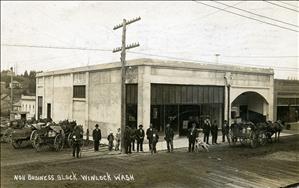On February 28, 1883, Winlock becomes the first town in Lewis County to be incorporated. The date is prominently recorded on the town seal. Nearly a decade earlier, on December 27, 1873, the town had been platted and registered under the name Winlock by Christopher C. Pagget (also spelled Pagett), an early settler and judge. Until that point, it had been called Grand Prairie. The name Winlock is chosen by Pagget's friend William Winlock Miller, who names the town after his son Winlock, just a toddler at the time. After Washington Territory becomes a state in 1889, Winlock reapplies for incorporation, which is granted on May 7, 1890.
Lost History
On February 28, 1883, Winlock became the first town to be incorporated in Lewis County. Ten years earlier, on December 27, 1873, the town had been platted and registered under the name Winlock by Christopher C. Pagget (also spelled Pagett), an early settler and judge. Before that it had been called Grand Prairie. The name Winlock was chosen by Pagget's friend William Winlock Miller, who named the town after his young son Winlock. At the time of incorporation Winlock's population was about 100. By 1888 the town had grown to 150 residents. The Northern Pacific Railroad station and a large barn that housed oxen were two of the its biggest buildings.
In 1889 Sam Herren (1856-1929) became Winlock's first mayor. He served for two years. In 1891, a major fire destroyed the Winlock business district, which included the town hall. All the early town records were destroyed, so there is no record of who governed Winlock at its inception.
In 1891, C. T. Hall served as mayor of Winlock. F. M. Lewis was marshal; Charles W. Whisler, treasurer; Maurice Langhorne, police judge; and William Jesse Wall (1854-1910), city clerk. Town councilmen were C. R. Hadley, G. W. Skinner, H. P. Whiteside, E. E. McFadden, and L. F. Furber.
A Question of Legality
With slow and spotty communications, the norm at the turn of the late nineteenth century, confusion arose around Winlock's incorporation. After Washington Territory becomes a state in 1889, Winlock reapplied for incorporation, which was granted on May 7, 1890. To clear up any questions, the town council in 1891 asked city attorney J. R. Buxton to review the incorporation to see whether it was legal, and "If not, to call a mass meeting to take steps to reincorporate. No further mention of the subject appears in the records, so it is assumed that attorney Buxton ruled that the incorporation was legal. What probably happened was that they filed the articles of incorporation in 1883 and waited a number of years before setting up a city administrator" (C. C. Wall, 22).
Minutes recorded from early town council meetings were full of the details that make up small-town life. In 1891 a resolution was passed that allowed Jack Nealy, one of Winlock's original settlers, to shoot birds in his orchard. Another law prohibited residents from tying up their horses for more than eight hours without food and water. Nealy appeared in the records again in 1891 when he was arrested. A local historian and future long-term Winlock mayor recounted: "Nealy was arrested and brought into police court for racing his horse up and down the street. The Judge asked him how fast he was riding. He, being still somewhat inebriated, replied '60 miles an hour.' The Judge asked him if he didn't think that was somewhat exaggerated. Old Jack replied, 'Judge, just exactly who was riding that horse, you, or me?'" (C. C. Wall, 23-24).
Governance and Growth
After Hall's term of office ended in 1891, the next seven mayors served one to two years each. They were Frank J. Shields (1892), J. P. Ellis (1893), Roland Smith (1893-1894), Ole Rosten (1895-1897), A. B. Kennedy (1898-1899), George P. Wall (1900-1902), and William Fowler (1903).
By 1894, the population of Winlock had reached 1,000 residents, and the town got its first electric lights the next year. A telephone exchange was operational by 1901. Starting in 1904, J. A. Veness, owner of several large lumber mills in the area, served as mayor for 22 years. For his first term, he received 72 votes out of 135. He also ran for office as state senator, which he won, and served in that capacity for two terms. He was followed as mayor by C. C. Wall, who served for 25 years, from 1926-1951.
A town seal was designed to include the year of incorporation (1883) along with a colorful depiction of the elements that make Winlock special: the giant egg, an eagle, railroad tracks, mountains, and the Winlock hatchery building -- a nod to the poultry and egg business that flourished and sustained the town in its earlier days.

